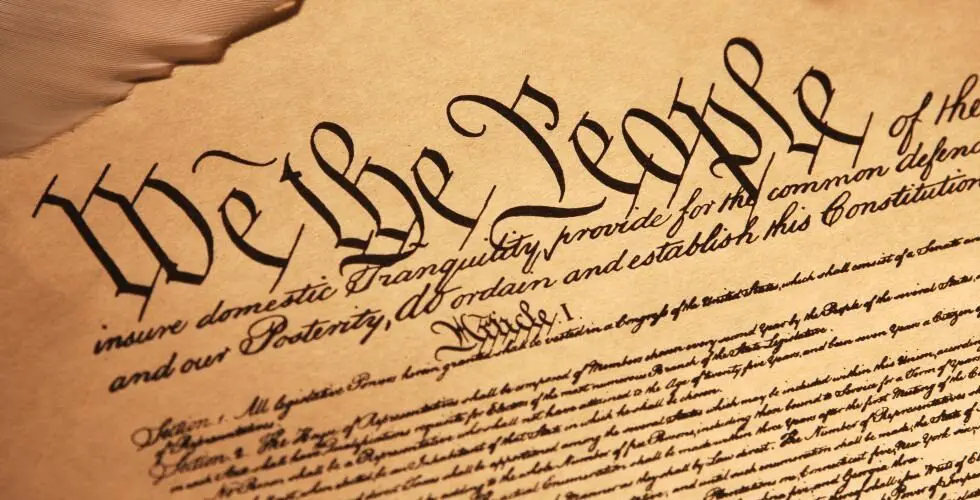
This essay continues the Christian Theology and Public Policy Course by John Cobin, author of the books Bible and Government and Christian Theology of Public Policy.
—-
In the Declaration of Independence, Thomas Jefferson stated: “We hold these truths to be self-evident, that all men are created equal, that they are endowed by their Creator with certain unalienable Rights; that among these are Life, Liberty, and the Pursuit of Happiness [or property].” However, this assertion must be supported—if not by theological premise then at least by social custom. If the vast majority of the members of society do not “hold these truths” then the rights to life, liberty and property will not be respected. A “self-evident” right or truth is one which is, according to the dictionary, “evident without proof or reasoning; producing certainty or conviction upon a bare presentation to the mind.”
Nonetheless, the idea that human beings have such fundamental or “natural” rights is not evident to many people. For instance, the Marxists are myriad who deny that human beings possess a right to property. An even greater number of people believe that only certain classes of human beings have rights to life or liberty. Unborn human beings are not considered to have rights until at least twenty weeks after conception—if not up until the point of birth (or beyond)—by many intelligent people. In some places, people regard those classified as incapacitated or economically unproductive as not being rights-bearers.
Still others find it perfectly acceptable to enslave certain classes of human beings—even the author of the Declaration of Independence owned Negro slaves! One need only consider the treatment of Indians and the Chinese Coulees to see that thinking regarding the abridgment of rights for certain classes of human beings extended far beyond the Founding Fathers. Furthermore, confiscation of income and wealth from certain classes of human beings by progressive and other kinds of taxation is not only commonplace but is widely considered to be civilized and just behavior.
So in what sense is the veracity of fundamental rights of life, liberty and property self-evident? Apparently, such rights were self-evident to the Founders, at least insofar as they were the province of Caucasians (and perhaps only Christian ones). For them, their rights were evident without proof or reasoning, producing certainty or conviction upon a bare presentation to the mind. It was obvious that they held natural rights to life, liberty, and property. It also made no difference whether savages or uncivilized human beings (like Indians, Negroes, Turks or Chinese) agreed with the self-evident nature of their rights.
The Founders knew that in order for society to be civil, and for men to be able to have effective social cooperation, some ground rules must be set down and agreed upon. If there would be no mutual and diligent respect for fundamental rights, then all their work in forming a civil government and its laws would be in vain. Setting aside the agendas and personal preferences of any members, they boiled down the rights to be respected to life, liberty, and property—the same three “natural” rights that philosopher John Locke had set forth in his Second Treatise of Civil Government (1690).
Locke based much of his thinking in the Bible, particularly the Old Testament. Man, being created in the image of God, was not to be killed by other men except for a capital offense (Genesis 1:26-27; 9:6), implementing and confirming man’s right to life. Permanent, involuntary slavery has always been an abomination for God’s people (Leviticus 25:39; Nehemiah 5:5; John 8:32, 35; 1 Corinthians 7:21; Galatians 5:1). The ownership and use of property to sustain a man’s life, as well as for his family and heirs and the people of God, is clearly expressed and its integrity is not questioned (Genesis 13:2; 23:9; 50:13; Numbers 27:8-11; 2 Samuel 19:32; 1 Kings 21:1-19; 1 Chronicles 27:31; 2 Chronicles 17:13; 32:29; Proverbs 13:22; 22:28; 23:10; Jeremiah 37:12; Matthew 25:14-30; Acts 5:4; 1 Timothy 6:17-19).
As time rolled on, the classes of human beings whose fundamental rights are self-evident has expanded to include all races. Chattel slavery is now outlawed in nearly every country. The only classes currently excluded from being full rights-bearers are those who suffer from a physical, mental, or developmental defect (including being unborn). However, another important element has entered in: these rights are no longer natural but are instead considered to be granted and held at the pleasure of the state. And even though human beings are rarely property, they are still routinely conscripted and have their labor or property extorted from them under color of law, effectively rendering them slaves—at least in an abstract sense.
Unlike the vision of the Founders, one class of human beings has now taken charge of deciding if and when other classes of human beings will enjoy the exalted level of being rights-bearers. Politicians, judges, and other rulers, acting upon the lead of savant philosophers, have taken the chief role in determining which human beings have rights, effectively rendering void the ideals of Jefferson and the other Founders. In a sobering sense, history is the record of how wide or how narrow has been the class of human beings who are afforded rights.
—-
Originally published in The Times Examiner on July 13, 2005.
Articles posted on LCI represent a broad range of views from authors who identify as both Christian and libertarian. Of course, not everyone will agree with every article, and not every article represents an official position from LCI. Please direct any inquiries regarding the specifics of the article to the author.
Did you read this in a non-English version? We would be grateful for your feedback on our auto-translation software.
), //libertarianchristians.com/wp-content/plugins/smartquizbuilder/includes/images/template6-latest.jpeg))

), https://libertarianchristians.com/wp-content/plugins/smartquizbuilder/includes/images/template6-latest.jpeg))








































), https://libertarianchristians.com/wp-content/plugins/smartquizbuilder/includes/images/template6-latest.jpeg))
), https://libertarianchristians.com/wp-content/plugins/smartquizbuilder/includes/images/template6-latest.jpeg))
), https://libertarianchristians.com/wp-content/plugins/smartquizbuilder/includes/images/template6-latest.jpeg))





*by signing up, you also agree to get weekly updates to our newsletter
Sign up and receive updates any day we publish a new article or podcast episode!